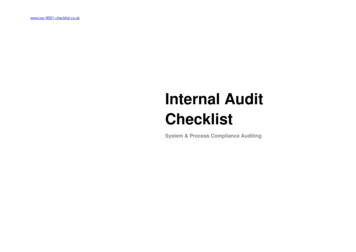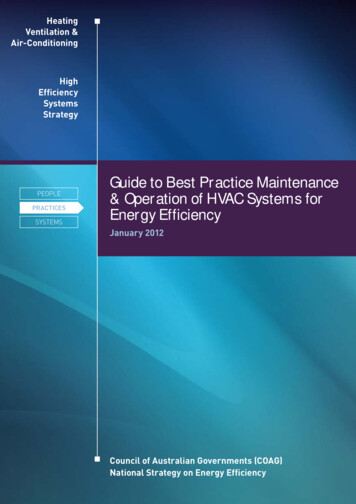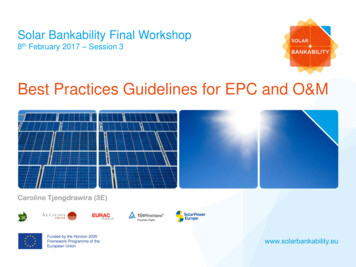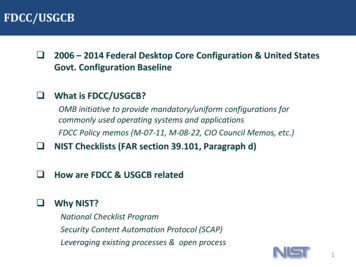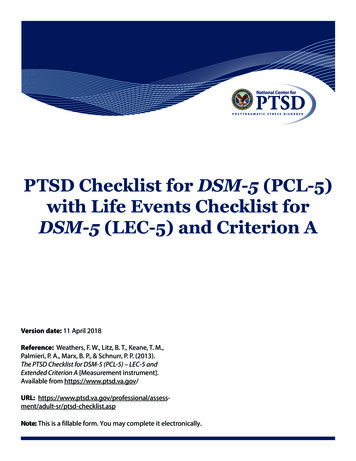
Transcription
PTSD Checklist for DSM-5 (PCL-5)with Life Events Checklist forDSM-5 (LEC-5) and Criterion AVersion date: 11 April 2018Reference: Weathers, F. W., Litz, B. T., Keane, T. M.,Palmieri, P. A., Marx, B. P., & Schnurr, P. P. (2013).The PTSD Checklist for DSM-5 (PCL-5) – LEC-5 andExtended Criterion A [Measurement instrument].Available from https://www.ptsd.va.gov/URL: ult-sr/ptsd-checklist.aspNote: This is a fillable form. You may complete it electronically.
This page intentionally left blank
PCL-5 with LEC-5 and Criterion APart 1Instructions: Listed below are a number of difficult or stressful things that sometimes happen to people. For eachevent check one or more of the boxes to the right to indicate that: (a) it happened to you personally; (b) you witnessedit happen to someone else; (c) you learned about it happening to a close family member or close friend; (d) you wereexposed to it as part of your job (for example, paramedic, police, military, or other first responder); (e) you’re not sure ifit fits; or (f) it doesn’t apply to you.Be sure to consider your entire life (growing up as well as adulthood) as you go through the list of events.EventHappenedto meWitnesseditLearnedabout itPart ofmy jobNotsureDoesn’tapply1. Natural disaster (for example, flood, hurricane,tornado, earthquake)2. Fire or explosion3. Transportation accident (for example, caraccident, boat accident, train wreck, plane crash)4. Serious accident at work, home, or duringrecreational activity5. Exposure to toxic substance (for example,dangerous chemicals, radiation)6. Physical assault (for example, being attacked, hit,slapped, kicked, beaten up)7. Assault with a weapon (for example, beingshot, stabbed, threatened with a knife, gun,bomb)8. Sexual assault (rape, attempted rape, made toperform any type of sexual act through force orthreat of harm)9. Other unwanted or uncomfortable sexualexperience10. Combat or exposure to a war-zone (in themilitary or as a civilian)11. Captivity (for example, being kidnapped,abducted, held hostage, prisoner of war)12. Life-threatening illness or injury13. Severe human suffering14. Sudden violent death (for example, homicide,suicide)15. Sudden accidental death16. Serious injury, harm, or death you caused tosomeone else17. Any other very stressful event or experiencePCL-5 with LEC-5 and Criterion A (11 April 2018)National Center for PTSDPage 1 of 3
Part 2A. If you checked anything for #17 in PART 1, briefly identify the event you were thinking of:B. If you have experienced more than one of the events in PART 1, think about the event you consider the worst event,which for this questionnaire means the event that currently bothers you the most. If you have experienced only one ofthe events in PART 1, use that one as the worst event. Please answer the following questions about the worst event(check all options that apply):Briefly describe the worst event (for example, what happened, who was involved, etc.).How long ago did it happen? (please estimate if you are not sure)How did you experience it?It happened to me directlyI witnessed itI learned about it happening to a close family member or close friendI was repeatedly exposed to details about it as part of my job (for example, paramedic, police, military, or otherfirst responder)Other, please describeWas someone’s life in danger?Yes, my lifeYes, someone else’s lifeNoWas someone seriously injured or killed?Yes, I was seriously injuredYes, someone else was seriously injured or killedNoDid it involve sexual violence?Yes NoIf the event involved the death of a close family member or close friend, was it due to some kind of accident orviolence, or was it due to natural causes?Accident or violenceNatural causesNot applicable (The event did not involve the death of a close family member or close friend)How many times altogether have you experienced a similar event as stressful or nearly as stressful as the worstevent?Just onceMore than once (please specify or estimate the total number of times you have had this experience )PCL-5 with LEC-5 and Criterion A (11 April 2018)National Center for PTSDPage 2 of 3
Part 3Below is a list of problems that people sometimes have in response to a very stressful experience. Keeping your worstevent in mind, please read each problem carefully and then circle one of the numbers to the right to indicate howmuch you have been bothered by that problem in the past month.Not atallA littlebitModeratelyQuitea bitExtremely1. Repeated, disturbing, and unwanted memories of thestressful experience?012342. Repeated, disturbing dreams of the stressful experience?012343. Suddenly feeling or acting as if the stressful experience wereactually happening again (as if you were actually back therereliving it)?012344. Feeling very upset when something reminded you of thestressful experience?012345. Having strong physical reactions when something remindedyou of the stressful experience (for example, heartpounding, trouble breathing, sweating)?012346. Avoiding memories, thoughts, or feelings related to thestressful experience?012347. Avoiding external reminders of the stressful experience (forexample, people, places, conversations, activities, objects, orsituations)?012348. Trouble remembering important parts of the stressfulexperience?012349. Having strong negative beliefs about yourself, other people,or the world (for example, having thoughts such as: I ambad, there is something seriously wrong with me,no one can be trusted, the world is completely dangerous)?0123410. Blaming yourself or someone else for the stressfulexperience or what happened after it?0123411. Having strong negative feelings such as fear, horror, anger,guilt, or shame?0123412. Loss of interest in activities that you used to enjoy?0123413. Feeling distant or cut off from other people?0123414. Trouble experiencing positive feelings (for example, beingunable to feel happiness or have loving feelings for peopleclose to you)?0123415. Irritable behavior, angry outbursts, or acting aggressively?0123416. Taking too many risks or doing things that could cause youharm?0123417. Being “superalert” or watchful or on guard?0123418. Feeling jumpy or easily startled?0123419. Having difficulty concentrating?0123420. Trouble falling or staying asleep?01234In the past month, how much were you bothered by:PCL-5 with LEC-5 and Criterion A (11 April 2018)National Center for PTSDPage 3 of 3
Life-threatening illness or injury 13. Severe human sufering; 14. Sudden violent death (for example, homicide, suicide) 15. Sudden accidental death; 16. Serious injury, harm, or death you caused to someone else 17. Any other very stressful event or experience







